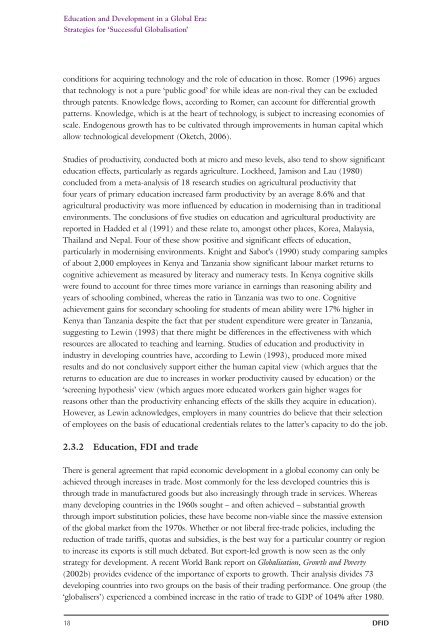education-dev-global-era-69
education-dev-global-era-69
education-dev-global-era-69
Create successful ePaper yourself
Turn your PDF publications into a flip-book with our unique Google optimized e-Paper software.
Education and Development in a Global Era:Strategies for ‘Successful Globalisation’conditions for acquiring technology and the role of <strong>education</strong> in those. Romer (1996) arguesthat technology is not a pure ‘public good’ for while ideas are non-rival they can be excludedthrough patents. Knowledge flows, according to Romer, can account for differential growthpatterns. Knowledge, which is at the heart of technology, is subject to increasing economies ofscale. Endogenous growth has to be cultivated through improvements in human capital whichallow technological <strong>dev</strong>elopment (Oketch, 2006).Studies of productivity, conducted both at micro and meso levels, also tend to show significant<strong>education</strong> effects, particularly as regards agriculture. Lockheed, Jamison and Lau (1980)concluded from a meta-analysis of 18 research studies on agricultural productivity thatfour years of primary <strong>education</strong> increased farm productivity by an av<strong>era</strong>ge 8.6% and thatagricultural productivity was more influenced by <strong>education</strong> in modernising than in traditionalenvironments. The conclusions of five studies on <strong>education</strong> and agricultural productivity arereported in Hadded et al (1991) and these relate to, amongst other places, Korea, Malaysia,Thailand and Nepal. Four of these show positive and significant effects of <strong>education</strong>,particularly in modernising environments. Knight and Sabot’s (1990) study comparing samplesof about 2,000 employees in Kenya and Tanzania show significant labour market returns tocognitive achievement as measured by lit<strong>era</strong>cy and num<strong>era</strong>cy tests. In Kenya cognitive skillswere found to account for three times more variance in earnings than reasoning ability andyears of schooling combined, whereas the ratio in Tanzania was two to one. Cognitiveachievement gains for secondary schooling for students of mean ability were 17% higher inKenya than Tanzania despite the fact that per student expenditure were greater in Tanzania,suggesting to Lewin (1993) that there might be differences in the effectiveness with whichresources are allocated to teaching and learning. Studies of <strong>education</strong> and productivity inindustry in <strong>dev</strong>eloping countries have, according to Lewin (1993), produced more mixedresults and do not conclusively support either the human capital view (which argues that thereturns to <strong>education</strong> are due to increases in worker productivity caused by <strong>education</strong>) or the‘screening hypothesis’ view (which argues more educated workers gain higher wages forreasons other than the productivity enhancing effects of the skills they acquire in <strong>education</strong>).However, as Lewin acknowledges, employers in many countries do believe that their selectionof employees on the basis of <strong>education</strong>al credentials relates to the latter’s capacity to do the job.2.3.2 Education, FDI and tradeThere is gen<strong>era</strong>l agreement that rapid economic <strong>dev</strong>elopment in a <strong>global</strong> economy can only beachieved through increases in trade. Most commonly for the less <strong>dev</strong>eloped countries this isthrough trade in manufactured goods but also increasingly through trade in services. Whereasmany <strong>dev</strong>eloping countries in the 1960s sought – and often achieved – substantial growththrough import substitution policies, these have become non-viable since the massive extensionof the <strong>global</strong> market from the 1970s. Whether or not lib<strong>era</strong>l free-trade policies, including thereduction of trade tariffs, quotas and subsidies, is the best way for a particular country or regionto increase its exports is still much debated. But export-led growth is now seen as the onlystrategy for <strong>dev</strong>elopment. A recent World Bank report on Globalisation, Growth and Poverty(2002b) provides evidence of the importance of exports to growth. Their analysis divides 73<strong>dev</strong>eloping countries into two groups on the basis of their trading performance. One group (the‘<strong>global</strong>isers’) experienced a combined increase in the ratio of trade to GDP of 104% after 1980.18 DFID





